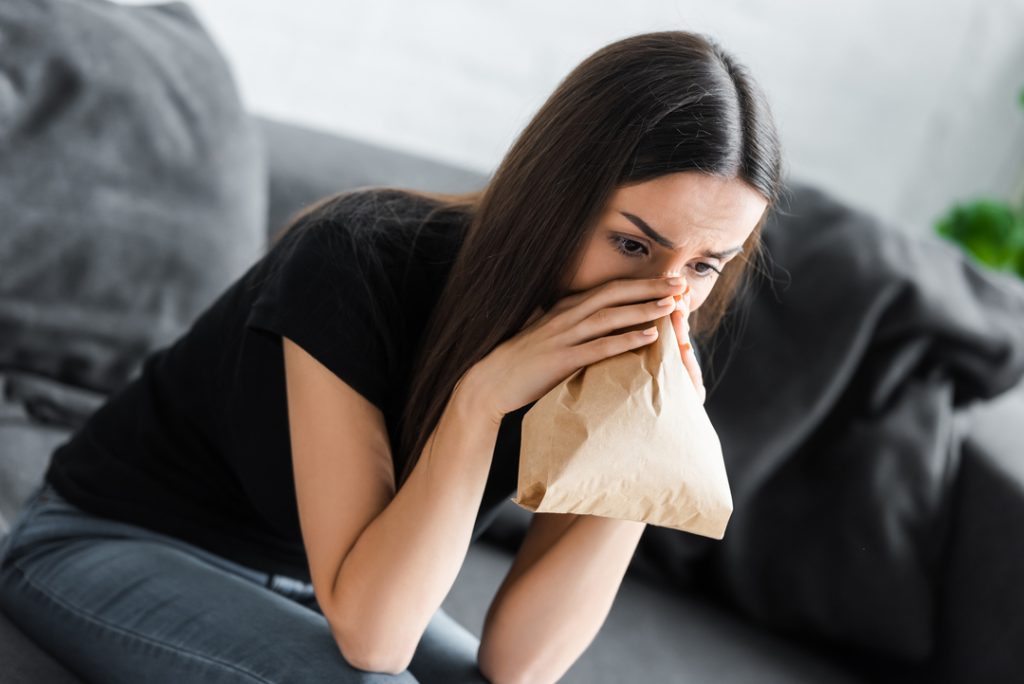Do you sometimes feel like you are running out of breath? No, you did not just complete a 5-kilometer run or a 30 minute intense HIIT workout. In fact, you don’t even know why you feel breathless.
This is one of the whole range of symptoms that you may feel when having a panic attack.
Feeling anxious is not uncommon. We all do, from time to time. But what the real challenge with teetering on the edge of or even having a panic attack is that it does not have a distinct cause.
When you come in contact with a cue that is even vaguely related to the last time you had a panic attack, your anxiety may be set off. This is roughly how it works.
As a result, you feel your heartbeat rising, your chest tightening, your body trembling. Your throat and mouth may dry up quickly and a sense of disorientation slowly washes over you.
In moments like these, you can quite literally feel your whole world closing in on you. Everything around you begins crashing down, and you feel helpless, as though you are tied up, unable to do anything about any of it. What exactly is this panic attack that has such a commanding influence over you?
What is a panic attack?
A panic attack is an intense episode of fear of a threat that can be either real or imaginary. When a panic attack occurs, it works to convince you of this fear, persuading you into accepting how real and dangerous the threat is.
It can trick you into thinking that you are dying, that you are going crazy, that you are about to faint or that you are losing control over yourself. Anything equivalently terrible.
The physical symptoms that accompany range from chest pain to choking, from sweating to shaking or trembling. These may not really be dangerous to your health.
Instead, they are powerful enough to convince you that they are, only worsening your reactions. Normally, a panic attack can last from 20 to 30 minutes, reaching its peak at around 10 minutes.
While there is considerable information about how to calm down after a panic attack, what will you have to do, if you want to effectively prevent one? Here are 8 different methods that you need to employ if you want to be free from the clutches of an anxiety attack in the long run.
1. Target your thought process
The crux of a panic attack lies within our thought patterns and what we think. What transpires within our minds can result in physical symptoms that can be debilitating.
Therefore, tackling our thought processes is a commendable way to proceed when you want to prevent panic attacks.
On a simple level, this can be done by yourself. Engage in regular, persistent, and patient modification of your thinking. Try not to focus too much on how things could go wrong.
Instead, look at the other side, and think of the better kind of ‘What ifs’ – What if nothing horrible happens,’ ‘What if it all goes well.’
This hold over your thoughts may not come to you so easily. It will take time and a lot of perseverance. An additional habit that you can take up is to journal your thoughts.
Journaling is extremely therapeutic and the best thing about it is that there is no agenda. As to what to write and when to write. You can take it at your own pace, and write anything you want to. As you slowly give shape to your thoughts, you are better able to handle them.
2. Seek help from a professional
In case you need assistance or help, exerting that control over your thoughts, you can always turn to therapy. Take some time to research the different kinds of services available and pick what you think would be best for you.
Psychotherapy can help you understand the intricacies of your panic attack, through talking. A form of psychotherapy known as Cognitive Behavioural Therapy (CBT) is highly effective in helping you deal with anxiety as it targets your thought processes directly.
The therapist will act as a guide, as you attempt to figure out how to deal with your anxiety.
3. Start meditating!
The goal of meditation is to help improve peace and calm within you, both physically and mentally. Gradually, through practice, you learn to live in the present better, and not worry about any imminent threats.
Try fixing a regular routine to practice relaxation techniques every day. You can spruce things up and can include any interesting practices that you like.
For example, you may take up meditation as a family or as a group of friends and practice group mindfulness meditation. Or you may also try to inculcate visual imagery through guided imagery modules that can be found on the internet.
Mindfulness meditation can help greatly in handling anxiety disorders and even panic attacks effectively.
4. Hone your breathing technique
You can also look to hone your breathing techniques. Learn how you can breathe better and practice this regularly.
Breathing can help greatly with anxiety, as when you breathe, it brings you back to the present. You regain the awareness of the now. Inhale deeply through your nose and exhale deeply through your mouth.
By coming back to the present, you stop worrying over things that you have no control over.

5. Limit social media usage
I came across interesting testimonials that talked about how when the person stopped using social media for a month, their panic attacks stopped.
We experience a sort of unbridled freedom on social media, and therefore, use it without restraints. While it may have been fun in the beginning, with the pandemic and increased online presence, it feels like social media has started occupying major chunks of our time every day.
When we use social media, it induces a toned-down sense of anxiety in us. We constantly engage in comparisons, which we have been conditioned to do.
We create competitions that don’t exist and judge ourselves harshly. We scrutinize our lives and over time, lose the ability to be grateful for the things that we have. All of this contributes a great deal to the anxiety building up within.
6. Be kind to yourself
Learn to be abundantly kind to yourself. Remember not to be too hard on yourself. Everyone makes mistakes and it is absolutely okay to err. Do not ponder over your mistakes, worrying yourself. This acts as fuel to the fire that is your anxiety.
Offer relentless affirmations to yourself. Remind yourself that tomorrow is a new day, full of hope and chances waiting to be taken. Do not let your thoughts escalate and get out of hand. Be kind to yourself and be patient.
7. Open up to someone you trust
When dealing with panic attacks, it is very important to not let your thoughts get ahead of you. When you sense this happening try to talk to someone you trust.
Look for this person and share your fears. Talking definitely helps a great deal, as you not only get another person’s perspective on your fears but also you know that there are people you can always rely on for support. Keep the ones you trust close to you and let them into your world. They won’t be judging you. Remember, they will love you no matter what.
8. Lean towards a healthier lifestyle
Try to incorporate healthy changes into your lifestyle. These changes mainly target your physical health, nevertheless, have a strong influence on your anxiety.
Engage in physical activity and exercise regularly. The endorphins that are released during workouts have remarkable calming abilities. Taking up this practice on a regular basis can gradually help control your anxiety and prevent panic attacks.
Try to include food that promotes peace and calm. For example, foods rich in magnesium are said to make you feel calmer. Therefore, consume such foods as spinach, legumes, nuts, and seeds, regularly. Foods rich in zinc also help lower anxiety. Some of these foods are oysters, cashews, beef, and egg yolk.
Try limiting the consumption of stimulants like caffeine. Unhealthy habits like smoking are also said to have direct links with heightened anxiety and lead to the occurrences of panic attacks.
Conclusion
As the celebrated poet Robert Frost remarked, “The best way out is always through.” When you feel your anxiety creeping up on you, try to remember who really is in control and try to exert that control.
Remind yourself that you can get through this. Remind yourself you can get through this because you always have gotten through. Remain in the situation causing your anxiety and try to think of how it is okay to confront your fear. Only when you deal with it directly, will you be able to get through it.
Coping with anxiety can be difficult, but it is something you will have to do. Things start seeming more manageable when you look at obstacles that come your way as challenges for you to overcome.
Try to handle your anxiety the same way. Don’t be so set on the destination, forgetting to enjoy the journey as you go through it. Take charge and work your way through it, patiently. Remember, ‘one day at a time.’





